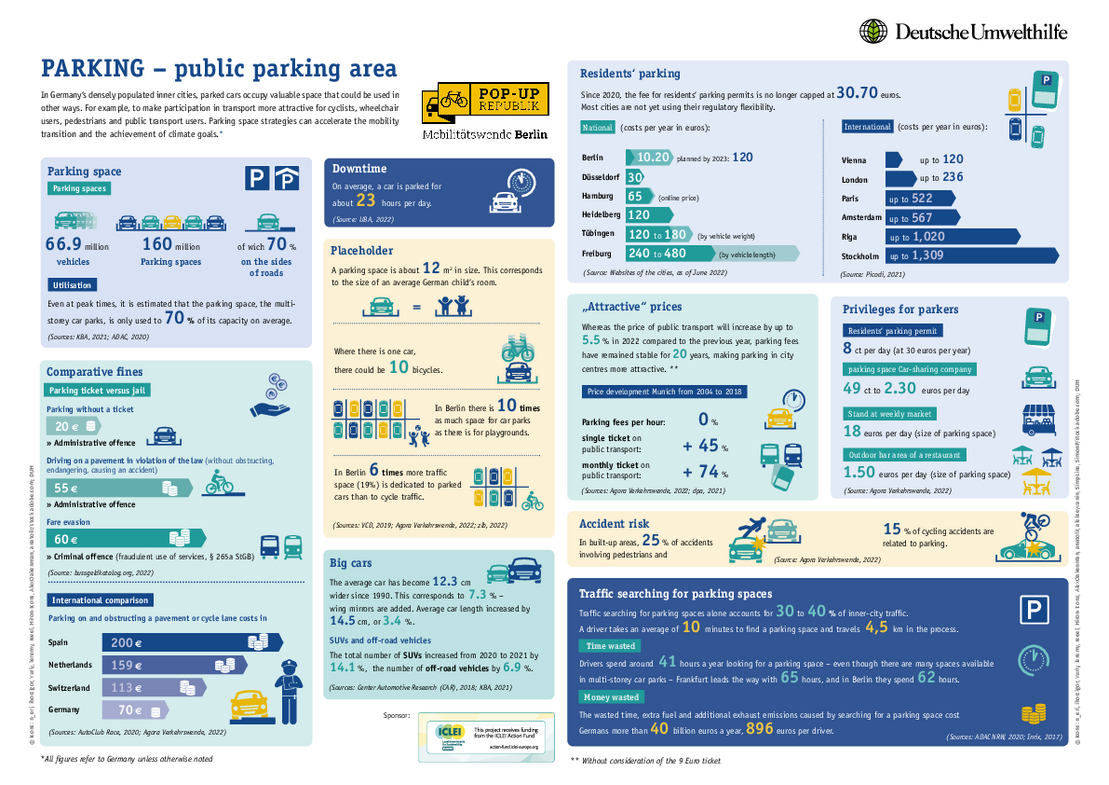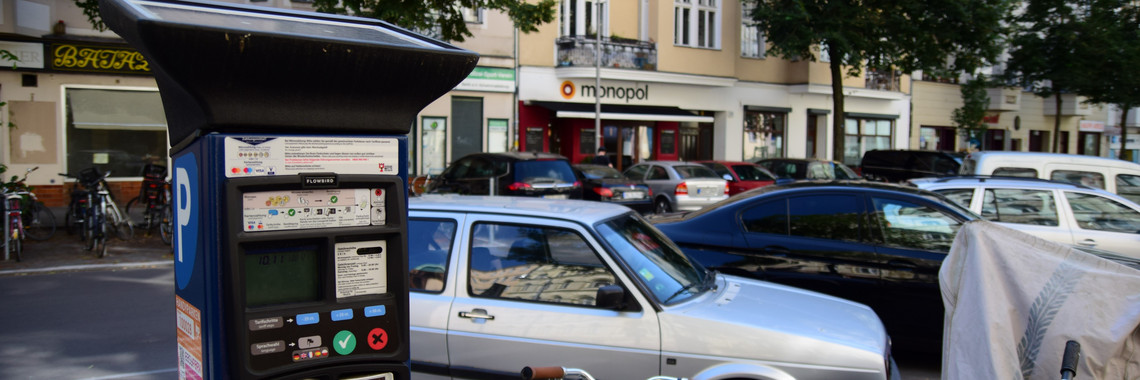Parking Spaces
Public road space in Germany is unfairly distributed. In Berlin, for example, 58 per cent of all traffic space is used by motor vehicles. Public space is particularly scarce and valuable in cities. Areas for playing, strolling and relaxing, as well as parks and green spaces are scarce. Cars standing idle for an average of 23 hours a day are taking up more and more public space as the number of vehicles increases year after year and the vehicles get bigger and bigger. As a result, cars are also taking up more and more space that is actually intended for cyclists and pedestrians.
Apart from reducing the quality of stay in urban areas, this poses a significant safety risk: According to the German Insurers Accident Research (UDV), almost one fifth of all accidents involving cyclists and pedestrians in urban areas are directly or indirectly related to parked motor vehicles. A key lever for reclaiming space for people is parking space management. Local authorities can use it to set appropriate prices for parking space or reduce its availability and thus influence the mobility behaviour of citizens. This in turn can lead to a reduction in noise pollution and an improvement in air quality.
Parking space management
Parking space management is the targeted control of the ratio of parking space search traffic to the number of available parking spaces on public roads. The aim is to reduce demand by introducing parking costs. One form of parking management that gives local inhabitants priority over commuters is resident parking. While a resident parking permit in Amsterdam costs up to 567 euros and in Stockholm even up to 1,309 euros per year, the fees in German cities are often no more than 30 euros per year. This does not even cover the administrative costs of issuing residents' parking permits, let alone the costs of building, cleaning and maintaining the parking spaces. Environmental Action Germany calls for the fee to be raised to at least 360 euros per year. This should lead people not dependent on their car to question their car ownership. The increasing revenues from parking fees must be channelled directly into the financing of bus and rail services as well as into the expansion of cycle lanes and footpaths.
- Are rising parking fees socially unjust?
No. While bus and train fares have become more expensive year after year, parking fees have remained low for decades. At the same time, people with low incomes are much less likely to own a car than wealthy people and are more likely to rely on environmental transport. This also applies to children, young people, the elderly, people with reduced mobility and people with prams. - What role does the designation of parking zones play?
Before parking spaces may be managed in an urban district, the administration first has to prove a high level of parking pressure in elaborate feasibility studies. Even today, there are still areas within the Berlin S-Bahn ring in which you can park for free. This is expected to change soon however, because: A court settlement for clean air between the state of Berlin and the DUH agreed on the comprehensive management of parking space within the S-Bahn ring by the end of 2023. However, this goal will probably be missed by years.
Parking space scarcity
In addition to fiscal instruments, reducing the number of parking spaces and redistributing public space are among the key measures for the transformation of mobility in cities. A noticeable reduction in inner-city parking facilities is recognised as leading to an increase in the shift from private motorised transport to public transport and cycle traffic. With more than 160 million parking spaces in Germany, there is an enormous surplus. Public multi-storey and underground car parks are often empty to a large extent. There is no right to a parking space close to home.
Berlin's Mitte district wants to be a pioneer in this area and plans to unseal up to 25 per cent of parking spaces by 2026 and make them available for tree planting and as neighbourhood-used urban space. In addition, parking spaces at intersections are to be "successively" converted into parking spaces for bicycles, cargo bikes and electric scooters.
Results from the project
The aim of the project was to make statements about the benefits of parking space management on the climate and air quality through an evaluation of various traffic and environmental data. Unfortunately, this was not possible to the extent desired. This was due on the one hand to considerable delays in the implementation of new parking management zones in the defined study areas of Großgörschenstrasse and Alt-Tempelhof and, on the other hand to a glaring lack of data in the study areas of Alt-Moabit.
Demands
In order to accelerate the establishment of new parking zones, certain regulatory adjustments are required. The obligation to prove a high level of parking pressure must be removed. In particular, it must be possible for local authorities to implement parking zone management on the basis of a municipal traffic concept on an area-wide basis or at least on a large scale. This must be taken into account as a matter of urgency in the upcoming reform of road traffic law.In addition, an expansion of parking space management, including adequate control density, is associated with a high demand for traffic controllers, as well as their equipment and premises. In order to counteract the lack of staff and resources for monitoring stationary traffic and to enable more extensive parking space monitoring, parking space management needs to be digitalised.The use of scan cars not only makes the control of parking violations more efficient thus improving road safety and the accessibility of public roads, but also enables the collection of valuable data that has been lacking up to now. In this way, the number of parking spaces can be determined, the utilisation of parking areas systematically monitored and the effectiveness of measures taken evaluated. Initial trials have already been conducted in Berlin. The digitalisation of parking space monitoring requires the amendment of federal and state law.


